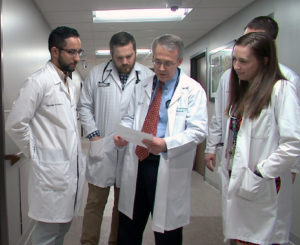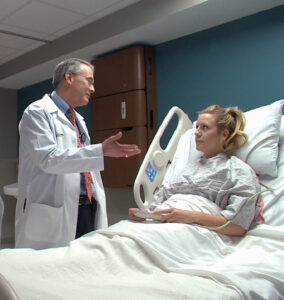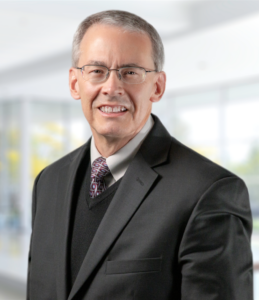Volunteer Profile: A Physician’s Dedication to Ethics from the Bedside to Boardroom

Stephen Salanski, MD, traces his interest in medical ethics to his 12 years in private Family Practice, including a number of his patients who were residents of John Knox Village, a senior living community in Lee’s Summit, Missouri.
“I participated in the Ethics Committee at John Knox,” he said, “and started to realize the importance of decisions that happen at the end of life.”
When Steve left private practice in 1999 to join the Baptist Medical Center Family Medicine Residency Program as a Faculty Physician – the same program where he had completed his own residency – he asked right away to serve on the hospital’s Ethics Committee.
“I understood the importance of the committee’s work,” he said, “but I still had a lot to learn.”
Steve served as Chair of the Baptist-Lutheran Medical Center Ethics Committee for seven years and then on the Research Medical Center Ethics Committee for 10 years.
Ethics Committee Consortium
As a member of the Ethics Committee at Baptist Medical Center, Steve began to attend meetings of the Kansas City Regional Ethics Committee Consortium.
The Center for Practical Bioethics founded the Consortium in 1986 with a three-year grant from the Greater Kansas City Community Foundation as a way to support startup ethics committees with which the Center was working.
At that time, the Consortium was led by Robert Potter, MD, PhD. When Dr. Potter announced plans to retire from the Center in February 2004, he and Center President and CEO Myra Christopher asked Steve to take on leadership of the Consortium.
Steve was reluctant at first.
“I thought there was no way I knew enough about bioethics to step into Dr. Potter’s shoes,” he said, “but Myra assured me there would always be a Center staff member to co-lead with me.”
The Consortium met bi-monthly and thrived under Steve and a succession of co-leaders.
The focus of these meetings was to study issues that transcended any one hospital. From these discussions and study, the group would develop policy guidelines that addressed ethically complex problems that all the hospitals were dealing with, such as withholding and withdrawing life-sustaining treatment, determining decisional capacity, and allocating scarce resources. These guidelines have often been used for discussion at participating hospitals, where policies could be formed to fit their unique situation.
“It was a multidisciplinary group – physicians, nurses, chaplains, social workers, lawyers and bioethicists,” said Steve. “There were no walls. It was the one place where we could have open and candid discussion among people from different hospitals and health systems because we all dealt with the same end-of-life issues.”
The Bigger Picture

After 17 years of participation in the Ethics Committee Consortium, Steve holds the record as the longest serving co-chair of the oldest continuously operating consortium of its kind in the United States.
In addition to the Consortium, Steve was drawn to the Center’s work in Advance Care Planning. He helped edit sections of the original Transportable Physician Orders for Patient Preferences (TPOPP/POLST) document and gave presentations about it throughout the metro area. As faculty for the Research Family Residency Program, he also used Caring Conversations resources to teach young family doctors how to guide their patients through the Advance Care Planning process.
Steve stepped back from the Consortium when he joined the Center’s Board of Directors in 2017 and currently serves as the 2023-24 Board Chair.
“I felt I needed a bigger picture of the Center and other aspects of its work,” he said. “Then Covid happened, and I got to see and be involved in the Center’s efforts to ensure that ethics – from vaccine distribution to protocols around scarce resources – was built into the community’s response.”

When Steve retired from medical practice in late 2021 after three years as medical director of CenterWell Senior-Focused Primary Care, his dedication to ethics from the bedside to the boardroom continued.
He was Chair of the Kansas City Medical Society Foundation Board in 2020 and again in 2023. He was President of the Kansas City Medical Society in 2016 and continues to serve on its Board and Leadership Council. Steve also represents the Medical Society on the Kansas City Health Collaborative Board, which is working to improve health equity and social drivers of health in the KC Metro.
He continues to serve on the AcruxKC Board (formerly known as the Baptist-Trinity-Lutheran Legacy Foundation), which he chaired in 2020, and which oversees the Kansas City Medicine Cabinet Program that provides medical funding assistance to underserved individuals in the Kansas City Region. Steve has also led community health initiatives in Lee’s Summit for almost fifteen years as Co-Chair of the Lee’s Summit Health Education Advisory Board and currently serves on the new Lee’s Summit Wellness Commission.
Proactive Ethics

Steve says that the biggest change he’s seen in the Center over the past two decades is its expansion of programs and services beyond the Kansas City region.
In times of political and social divisions such as today, he believes more than ever in the Center’s mission to raise and respond to ethical issues in health and healthcare. He cites the Center’s response to the U.S. Supreme Court’s Dobbs decision on June 24, 2022. That same day, the State of Missouri’s criminal ban on abortion went into effect.
“We had to respond!” said Steve, which the Center did in a white paper entitled ,“Ethical Considerations, Precepts, and Recommendations in a Post-Dobbs World,” emphasizing “thoughtful, reasonable, respectful, open, and transparent dialog.”
Having been involved with the Center for Practical Bioethics for over half of its four decades, Steve comes back to the importance of education regarding end-of-life issues, as well as the value of the Center’s capacity to inject ethics proactively into dilemmas we can hardly foresee, such as artificial intelligence.
In 2018, when few outside of IT and the tech world were paying attention, the Center was prescient in launching the Ethical AI Initiative to address the ethical implications of AI in healthcare. Today, concerns about AI and how it’s being utilized are everywhere in healthcare, with the Center out front in providing tools, processes and standards to help providers responsibly select and safely deploy AI systems.
“Supporting the Center is critical to all of this work,” says Steve, “and I’m pleased that I’ve been able to share my time, talent and treasure to make it possible.”
Make an impact
Every dollar you give helps providers, clinicians, patients and families decide what to do when it’s hard to agree about the “right” thing to do.


